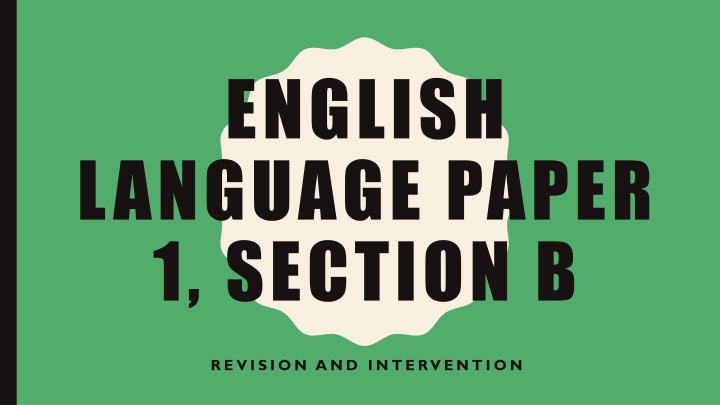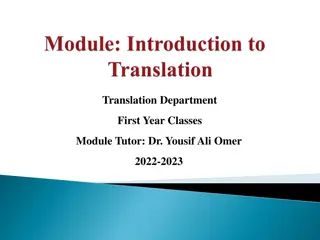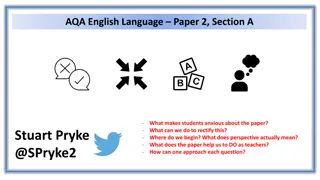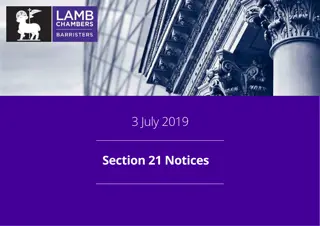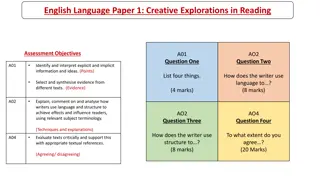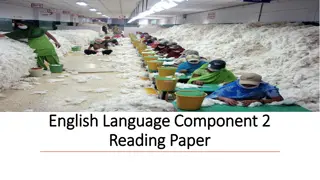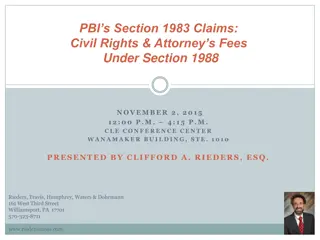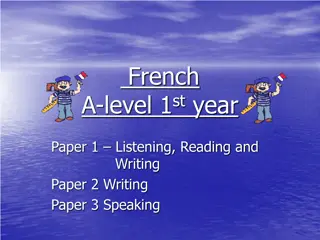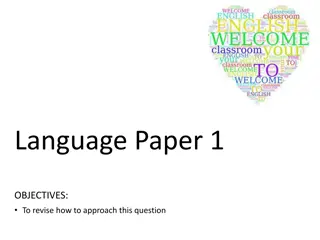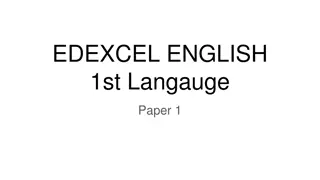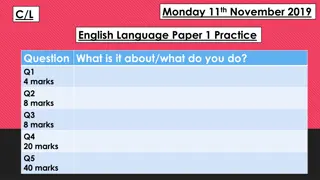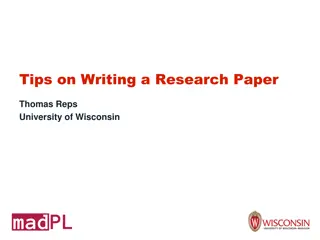Effective Tips for English Language Paper 1, Section B
Writing Section B in Paper 1 involves choosing between description or story tasks. Tips for success include engaging writing, varied techniques, vocabulary usage, structured paragraphs, and narrative planning strategies. Vocabulary enhancement and narrative planning are key elements in achieving a higher grade.
Download Presentation

Please find below an Image/Link to download the presentation.
The content on the website is provided AS IS for your information and personal use only. It may not be sold, licensed, or shared on other websites without obtaining consent from the author.If you encounter any issues during the download, it is possible that the publisher has removed the file from their server.
You are allowed to download the files provided on this website for personal or commercial use, subject to the condition that they are used lawfully. All files are the property of their respective owners.
The content on the website is provided AS IS for your information and personal use only. It may not be sold, licensed, or shared on other websites without obtaining consent from the author.
E N D
Presentation Transcript
ENGLISH LANGUAGE PAPER 1, SECTION B REVISION AND INTERVENTION
WRITING SECTION B, PAPER 1 There are two questions to choose from: one might be a description based on an image; the other might be to write a story. However, both questions might ask you to write a story; equally, both questions might ask you to describe: For example, one paper included these questions: Write a description of young children leaving home as suggested by this picture: Write a description about a person who has made a strong impression on you Another paper included these: Write a story set on a dark night as suggested by this picture: Write a story about a game that goes badly wrong.
TOP TIPS FOR DOING WELL The important thing is to write in an engaging way. Think about the techniques you re going to use personification, metaphors etc. Describe the scene for your reader pathetic fallacy, for example. Foreshadowing is good hint at the events to come. Don t try to write loads there is no correlation between the weight of an exam paper and the grade it receives. Two sides of tightly controlled writing can be impressive. Clear and linked paragraphs. Think about how this will happen. Is your narrative chronological? Flashback? Signal the shifts CLEARLY to your reader. Use a range of sentence and paragraph lengths. DELIBERATELY build in short sentences for effect; a short(er) paragraph. Some repetition. Three part lists etc.
TOP TIPS CONTINUED VOCABULARY this appears in the AO5 and AO6 mark scheme. This is from the level 4 descriptors for AO5: Extensive and ambitious vocabulary with sustained crafting of linguistic devices. This doesn t mean you need to have swallowed a dictionary but some carefully chosen words can be effective. You have these in your armoury: how many different words for running can you think of, for example?
PLANNING NARRATIVES For our revision session, we ll be looking at planning narratives.Here are some ideas that we will go through in the session. We might not get round to all of them, but I ve included all the slides here for reference. You will have better ideas. But use these as a springboard for thinking.
BEGINNING Set the mood for the story here Spend some time setting up the situation. A couple of paragraphs. Imagine your reader is watching a film. Scan the setting for them. Pick out little details and use a metaphor, personification or a simile. You don t have to use pathetic fallacy however. The setting could contrast with the mood. Use some effective prepositional phrases to help with describing the physical space to your reader (E.G. from behind the wall, little snuffling sounds were a warning to me to turn back ) Chekhov s gun draw the reader s attention to something that will have importance later on: (E.g. Up ahead, a car stopped for a moment. Its brakes flickered in the gloom. I thought I heard a door slam but then the car continued on.) Try to avoid dialogue in the opening. Focus on the atmosphere and ideas.
CHEKHOV'S GUN Chekhov's gun is a dramatic principle that states that every element in a story must be necessary, and irrelevant elements should be removed; elements should not appear to make "false promises" by never coming into play of story. The statement is recorded in letters by Anton Chekhov several times, with some variation "Remove everything that has no relevance to the story. If you say in the first chapter that there is a rifle hanging on the wall, in the second or third chapter it absolutely must go off. If it's not going to be fired, it shouldn't be hanging there. "One must never place a loaded rifle on the stage if it isn't going to go off. It's wrong to make promises you don't mean to keep." Chekhov, letter to Aleksandr Semenovich Lazarev (pseudonym of A. S. Gruzinsky), 1 November 1889 Here the "gun" is a monologue that Chekhov deemed superfluous and unrelated to the rest of the play.
